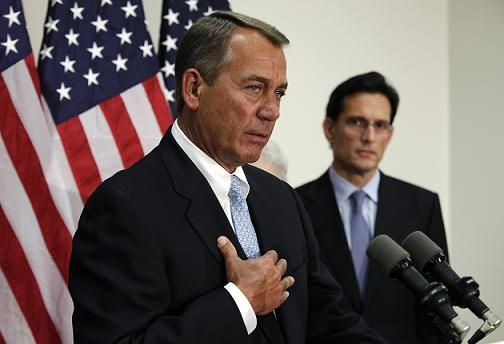Boehner Sends Obama $2 Trillion Fiscal Cliff Counteroffer

Republican leaders in the House on Monday sent a counterproposal to the White House for averting the “fiscal cliff” that they say would result in more than $2 trillion in savings without raising taxes on the wealthiest.
The GOP leadership's letter to President Barack Obama is based on the middle-ground approach first outlined to Congress last year by Erskine Bowles, who was former President Bill Clinton’s chief of staff and co-chaired Obama’s debt commission.
Bowles’s 2011 proposal consisted of spending cuts, health care savings and new revenues through tax reform based largely on closing loopholes.
The Republicans' blueprint of more than $2 trillion doesn’t highlight many specifics, but calls for some $800 billion in new revenue through closing loopholes and capping deductions, all while lowering tax rates. Some $600 billion will also be cut from federal health programs, and $600 billion more from other mandatory and discretionary cuts. Other savings would come, in the amount of $200 billion over a decade, mainly from changes in the way inflation is calculated.
“This is by no means an adequate long-term solution, as resolving our long-term fiscal crisis will require fundamental entitlement reform,” the letter signed by Speaker John Boehner, R-Ohio, and others read. “Indeed, the Bowles plan is exactly the kind of imperfect, but fair middle ground that allows us to avert the fiscal cliff without hurting our economy and destroying jobs. We believe it warrants immediate consideration.”
The Republican leaders said if Obama agrees to the proposal they are “ready and eager to begin discussions.”
But the proposal might already be dead as Obama has said time and again he will not accept any proposal that doesn’t include a raise in taxes for the wealthy. White House Press Secretary Jay Carney reiterated that point Monday.
Later, White House Communications Director Dan Pfeiffer said in an official statement: "The Republican letter released today does not meet the test of balance. In fact, it actually promises to lower rates for the wealthy and sticks the middle class with the bill."
The president has put forward a plan calling for $1.6 trillion in new tax revenue, raising rates on the top 2 percent, hundreds of billions in spending cuts, and for tax cuts to be extended for the middle class before the end of this month.
Bowles himself took issue with the House plan.
"While I'm flattered the speaker would call something 'the Bowles plan,' the approach outlined in the letter Speaker Boehner sent to the president does not represent the Simpson-Bowles plan, nor is it the Bowles plan," Bowles said in a statement released Monday afternoon, reported by USA Today.
"Every offer put forward brings us closer to a deal, but to reach an agreement, it will be necessary for both sides to move beyond their opening positions and reach agreement on a comprehensive plan which avoids the fiscal cliff and puts the debt on a clear downward path relative to the economy," Bowles' statement said.
The GOP plan also has nothing to say about how to raise the debt ceiling, USA Today reported. That's another non-starter for the White House, which wants to use the fiscal cliff negotiations to include an agreement to raise the debt ceiling in February when the U.S. is expected to hit its $16.4 trillion borrowing limit. Obama wants to avoid another debt limit fight with congressional Republicans like the one that rattled Wall Street in the summer of 2011.
At this rate, "we will go over the cliff," Sen. Tom Coburn, R-Okla., told CNN Monday night.
"All this jockeying in public - we need real leadership right now. There shouldn't be anything offered in public," he said." "What it should be is the president and Speaker Boehner in a room and nobody comes out of the room until this is solved."
"I'm okay to compromise even on some of my issues if in fact we'll solve the problem," Coburn continued. "But what we have is a game being played ... for the extreme right wing and the extreme left wing in this country rather than coming together and leading and solving the problem."
Boehner also came under attack from his right.
Americans For Prosperity, a conservative group behind numerous tea party protests and organizing efforts, attacked the spending cuts in Boehner's plan as "disappointingly small" in a statement Monday night, Talking Points Memo reported.
"Sadly this plan leaves conservatives wanting," AFP president Tim Phillips said.
"The president's proposal and Speaker Boehner's counteroffer fail to seriously deal with the reality of the problems facing the nation. Conservatives are looking for a leader to fight against tax increases, to push back against wasteful government spending, and address the fiscal challenges in a bold way," he said.
© Copyright IBTimes 2024. All rights reserved.






















